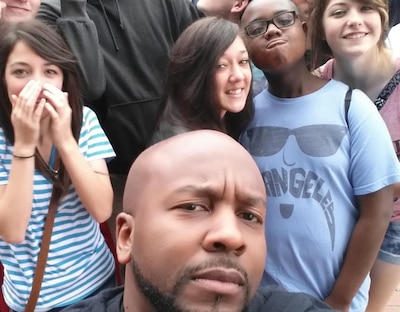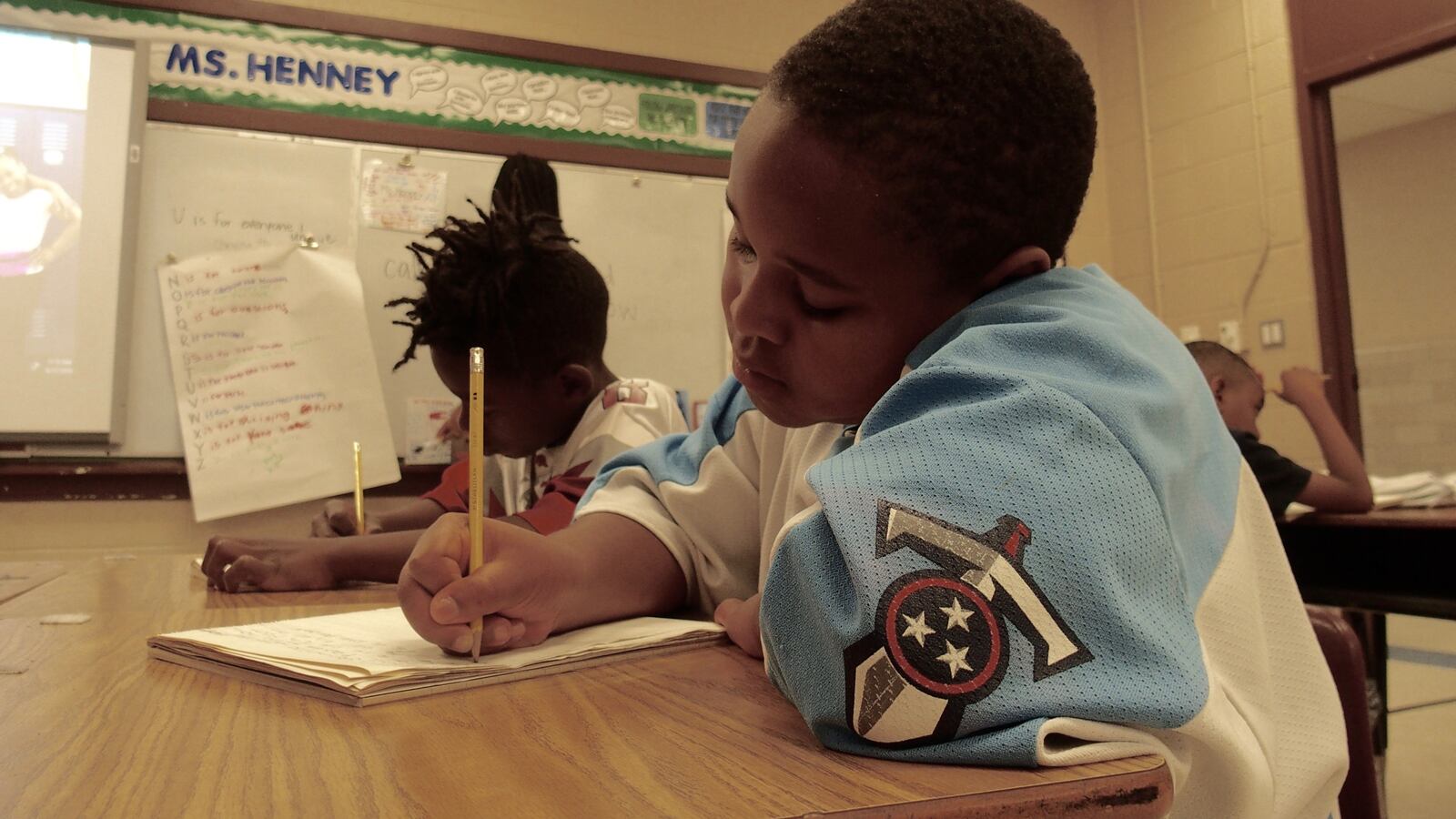
In the two decades Memphis native Loren Smith has taught in his hometown, he has found that the biggest deterrent to student success is lack of reading skills.
Now a sixth-grade English teacher at Woodstock Middle School in Shelby County Schools, Smith has a plan to boost his students’ reading levels. He just needs a million dollars.
“Most of our students struggle to read very simple words,” Smith said. “If I were a millionaire, I’d provide a library, a preschool/daycare center, and a community center. I think those are the missing pieces to making our students super successful.”
But until he wins the lottery, Smith said he is making headway by encouraging his students to enjoy writing about topics they are passionate about. He gets to the grammar and punctuation later.
“I think that many people can be extremely critical about my students’ abilities to communicate,” he said. “So, the students are afraid of being judged. I take away the judgment. I build their confidence before teaching the skills.”
RELATED: Memphis third-grade reading scores dip as district builds case for retaining students
We spoke with Smith about an interaction with a student that he always remembers, his disdain for early school start times, and his love for chicken wings.
The interview has been lightly edited for length and clarity.
How do you get to know your students?
I’ve learned that when you open up to people and come from a place of vulnerability, they trust you easily. So, I share things about my life, and then I have them share about their own hobbies and passions.
A humorous example is my passion for chicken wings. I love to eat chicken wings. And stories about trying another chicken wing spot in town always get my students going. People love to talk about food. The minute that I tell them a chicken wing story, my students are all saying, “Let me tell my story next, please Mr. Smith.”
Tell us about a favorite lesson to teach. Where did the idea come from?
I am very fond of including life lessons in writing lessons. Little people don’t care much for writing but they do like giving oral details about their adventures, mischievous or otherwise. I love their attention to detail when telling a story, and I ask them to translate that into writing.
My feedback to them is so important. But I don’t grade for grammar or structure when doing this kind of lesson. I simply respond to their thoughts. I think that many people can be extremely critical about my students’ abilities to communicate. So, the students are afraid of being judged. I take away the judgment. I build their confidence before teaching the skills.
What object would you be helpless without during the school day?
I am helpless without my laptop. I need it for instruction, communication, looking at data, creating lessons/plans, and ordering food because my school is pretty far out of town.
What’s something happening in the community that affects what goes on inside your class?
Many of my students come from Northaven, an area north of the city. It is a community filled with hard-working families and approximately 5,000 people live there. But there isn’t a library or community center there. The closest ones are miles away in Frayser, a neighborhood south of Northaven.
My students don’t have access to books outside of school. They go home and literally unlearn everything that they learn during the day. Even if parents worked three jobs, a community library or community center with tutoring or engaging reading programs would boost our students’ reading abilities. Most of our students struggle to read very simple words. If I were a millionaire, I’d provide a library, a preschool/daycare center, and a community center. I think those are the missing pieces to making our students super successful.
Tell us about a memorable time — good or bad — when a student changed your perspective or approach.
In my fourth year of teaching, I met a young lady who was very angry with the world. She was a 12-year-old in fifth grade, and she fought often. Slowly, she began to open up to me as I continuously reassured her of her ability to be great. School was starting to become a safe space for her.
I soon discovered that she was the oldest of 10 children, and they were all living in a very cramped space. She was the primary caretaker while her mom worked nights. She was simply overwhelmed. I understood. Her situation made me want to work harder for her. The young lady became one of my best students in a matter of months. She never wanted to miss a day.
One Monday, during lunch, I read the newspaper as I did every day and saw the most heart-wrenching news. I’d like to think that I have a pretty nice grip on my emotions, but at that moment, I bawled like a baby and had to leave the building. Over the weekend, my student’s mother was struck by a vehicle and died. It was a hit and run. The grandmother showed up at the end of the day. She told me that she was taking her grandchildren to Chicago. I never saw the student again.
That moment defined my career focus, it made me realize that I don’t teach for me. I teach because many of our students will have to fend for themselves. They need guidance to be able to do that. They need to know that someone cares enough about their well-being in order for them to even receive knowledge. I often ask my students, “What will you do for yourself if you find that all of the adults are gone? Will your education be relevant, then?”
What part of your job is the most difficult?
After 20 years in this business, I have to say that waking up early is the most difficult thing. Working with people is my peace. But what I can’t figure out is why schools are dedicated to this unnatural start to the school day. Geesh! My mind doesn’t wake up until at least 9 a.m. I clock in at 6:45 a.m. Really?
What was your biggest misconception that you initially brought to teaching?
This is very simple. I thought that teaching was going to be easy. My teachers made it look that way. Growing up, I attended schools within the “optional” program, kind of like a gifted program where students have to test in. They were classes for overzealous students. Those kids wanted to be there. The first time that I ever witnessed students actively avoiding school was when I started teaching.
What are you reading for enjoyment?
Currently, I am reading “The Water Dancer” by Ta-Nehisi Coates. So far, really good.


